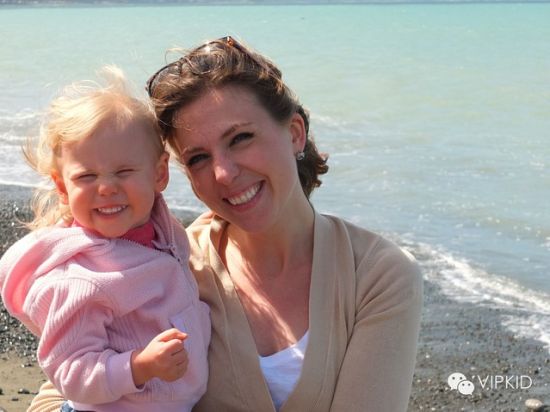孩子不听话 来点“小规矩”吧(图)
- 活动报名:移动互联时代教育机构如何再创业
- 高峰论坛:奔跑吧,在线教育!
- 有奖评测:寻找中国最好的教育APP
- 奖项投票:2014中国教育盛典各大奖项投票中
- 新浪教育2014年“中国教育盛典”盛大启动
 上图是VIPKID Curriculum Manager Lane 和小女儿Stella~
上图是VIPKID Curriculum Manager Lane 和小女儿Stella~问题:“在美国,爸爸妈妈们怎么处理孩子在公共场合的一些不当行为?他们会采取哪些方式帮助孩子养成良好行为举止?”
Discipline is a polarizing issue for Americans. Not all Americans have the same opinions about how to raise a polite, obedient child and different families take different approaches. This being said, most Americans agree that setting boundaries for a child is of the upmost importance to a child’s growth and development. For French parents, creating a system-an outlined structure of rules- is considered central to a child‘s social and emotional well being. Even the famous Montessori system, developed by Italian educator Maria Montessori, allows children to make their own choices, as long as those choices happen inside of a structured system of social and emotional guidelines. A clear system of rules help a child feel secure and understand what is expected of them inside of the family structure. This family structure is the child’s first example of how people in the outside world interact with one another。
在美国,关于孩子行为举止的界限是一个仁者见仁智者见智的问题,不同的家庭有不同的方式。但整体说来,大部分美国家长[微博]都有一个共识:给孩子明确传达基本行为规范对孩子的成长发展大有裨益。不光美国,法国家长看来,从小给孩子一个基本行为规范对孩子社交和情感的健康成长意义深远。就连著名的蒙特梭利教育体系(创始人为意大利教育家Maria Montessori)也认为,孩子有权利当自己生活的主人,但前提是要在一个大的社会和情感行为准则之上。一个清楚的行为规范能让孩子变得稳重,也能更好理解家庭对于他们的期望-家庭是孩子了解世界与世界互动的最初体验。
It is not difficult to create a system of boundaries that work in your home. Begin by establishing three or four positive rules that can encompass a variety of situations. My husband and I created the following rules for our two year old daughter, Stella. Our nanny, Zhang Ayi, has been wonderfully supportive in helping us enforce these rules and our home life is much less dramatic because our daughter understands what is expected of her.Our rules are:
在家里建立一套基本行为规范没有大家想的那么困难,大致建立三到四个比较宽泛的家庭规矩就是个不错的开始。比如,我和丈夫就为我们两岁的女儿Stella建立了以下的规范。(我们的保姆张阿姨也超级配合我们去实施这些规矩,我们家就没有发生其他家庭常常遇到的很失控的情况,因为在这样的规矩下,小女儿知道我们对她的期待。)
1.Be nice。
(This rule covers no hitting and no saying hurtful things. Instead of hitting or scratching, Stella is encouraged to voice how she is feeling. Something as simple as “I’m angry!” helps Mommy,Daddy, and Ayi teach her the next steps to take to appropriately deal with her emotions。)
1.与人为善(包括不打人不说伤害人的话。我们鼓励Stella将自己的感受表达出来,比如当她生气的时候她可以直接说“我很生气。”这样就能让我们了解她的真实感受并帮助她一步步管理自己的情绪。)
2.Listen to Mommy/Daddy/Ayi。
(We employ the “three strike rule” in my house. When my husband and I ask Stella to do something, she is allowed one reminder. If she still doesn’t listen, we count backwards from 5 to 1. If she still doesn’t listen, we physically pick her up and make her do as she is told. This physical handling works well for a two year old but is much more difficult for an older child. Taking away something important to the child, such as TV time or ice cream, is an alternative. It was not easy for my child to accept this rule (she still tests it from time to time), but in the end our persistence has paid off and we are a much happier family because of it。)
2.懂得倾听(当我们让Stella去做什么事情的时候,她有一次被提醒的机会。如果提醒一次她还是不听,我们会很严肃地从5倒数到1。如果这样她还不听,我们会把她拉过来硬性要求她做事情。对于两岁孩子来说,这样的效果不错,但对大一些的孩子来说就不一定了。还有其他方式,比如将电视强行关掉,将她手里的冰淇凌拿走。我的孩子一开始遵循这些规矩的时候并不容易(直到现在她还时不时地“挑战”一下我们),但最终我们的坚持得到了回报。得益于这些规矩,我们现在很幸福。)
3.Stay in bed. (Bedtime is important. Although this varies from child to child, for a growing brain to develop a1-3 year old child needs 12 to 14 hours of sleep per day. For a 3-6 year old,this number decreases to 10-12 hours. A 7-11 year old still needs 10-11 hours of sleep in order to function at maximum capacity. As an educator in China,many of the behavior and learning issues I have encountered have been a direct result of sleep deprivation. Children cannot learn or behave when they are tired. My daughter is allowed to sing in her bed and play with her stuffed animals and as long as she does NOT get out of the bed. Most American children sleep by themselves from the age of 1 and Stella is no exception. We find her asleep within 15 minutes and listening to her sing to her stuffed dog everynight is something I will cherish forever。)
3.乖乖睡觉(孩子的睡眠重要。可能孩子与孩子之间有差异,但对于1-3岁正在脑部发育的宝贝而言,每天保持12-14小时的睡眠是必须的;对于3-6岁的孩子,要睡满10-12小时;7-11岁需要10-11小时睡眠。在中国做教育这些年我发现,很多孩子的行为习惯和学习问题都是睡眠不足导致的。孩子疲倦的时候他们是不能很好学习或举止得当的。我们允许小女儿在床上随意唱歌、玩玩具,但前提是必须“乖乖在床上呆着”。在美国大多数小孩从一岁开始自己睡觉,我们的小女儿也不例外。我将永远珍视她睡前对玩具狗狗哼哼的歌)
This behavior approach does not work overnight, and will not work at all if it is not supported by all adults in the family. Sitting down with Grandma and Grandpa to create this structure is an important step in achieving familial harmony and raising a socially adept child。
这种规范如果没有全家的通力坚持执行是不会有效的。爸爸妈妈们,找到合适时机和爷爷奶奶坐下来认真聊一聊达成一致会让家庭幸福孩子健康成长哦。
Lane的简介
Lane is an education professional with eight years of experience teaching and designing curriculum. Lane was born in a small city in America and as a child dreamed of traveling the world. After graduating from university and living in Mexico and Spain, Lane moved to Guangzhou, China. She met her husband(a New Zealander) in Guangzhou and, in 2012, their daughter Stella was born. Lane’s passion for education continues to motivate her to create educational materials that benefit children both cognitively and socially. Lane aspires to make language learning an experience which captures and cultivates children’s natural passion and curiosity。
宜兰是一个拥有八年的教学课程设计经验的学术专家。她出生在美国一个小城市,在小时候就梦想着环游世界。大学毕业后,住在墨西哥和西班牙,后来她搬到了中国的广东。在广州,她遇到了她的丈夫(一个新西兰人), 2012年,他们的女儿呱呱坠地。宜兰对教育的热情激励着她对教材编写的热情, 为儿童和社会做出贡献。宜兰希望语言学习能成为一种培养儿童自然激情和好奇心的体验。
文章关键词: 孩子
- “听话者死”不足以推翻“教育常识”2014-05-05 10:10
- 病态父母的“听话哲学”只会让孩子死亡2014-04-30 16:50
- 专家:在家中鼓励孩子阅读的小窍门(图)2014-11-11 10:55
- 双语:改变孩子人生的二十件小事(图)2014-11-11 09:59
- 双语阅读:小孩子9岁前要学会的25条礼仪2014-11-11 09:40


















閺傜増姘拃锔俱仛閿涙矮鎹㈡担鏇熸暪鐠愬綊顣╁ù瀣兊缁併劋绱伴崨妯肩搼楠炲灝鎲¢惃鍡曡礋鐠囧牓鐛ラ敍宀冾嚞閸曞じ绗傝ぐ鎿勭磼閻愮懓鍤潻娑樺弳鐠囷附鍎�